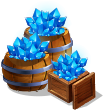Vol.4, Ch.4, P.9
“I’ll be damned…!”
Sig and I had gained the plains at last, finding there what we’d foreseen: the Víly-Gorka host standing incontestably victorious. It was nigh noontide; the battle was ended, and our braves were busy caring for the wounded, surveying the casualties, taking stock, and altogether cleaning up after the chaos. As for the knights of the 3rd, they were nowhere to be seen save for their dead, who were strewn in a long strip of desolation that dragged through the battlefield, like an unbending river running red and silver… and black, as flocks of carrion birds were clustering over the corpses, no doubt fatter now than when they had come. A gruesome sight, surely, but as war-chief, it ought’ve filled me with joy. Only, it was dread that I knew.
“Rolf! Sig!”
Hailing us in our approach was Lise, having spotted us from afar. Dismounting our tired and sweating steeds, we met the jarl-daughter as she rounded by with braves in tow. From high on their own horses, however, they hardly appeared to have been celebrating.
“All right, I reckons?” Sig greeted her; the two by now were well-acquainted, though one might mistake otherwise, as Lise gave him no answer. “…Aye, too right,” Sig surmised.
“Yes… something’s amiss,” Lise said at length. Trouble was writ clear on her face. The strangeness of the situation, it would seem, had been sitting no better with her.
“All bark and no bite, the knights?” I guessed gravely.
“None at all. The winds were confused; we expected ambush at any moment, but…” Lise explained in an anxious sputter. “We now fear forces unseen might yet be about, waiting to pounce. And so we’ve set watches, and sent scouts to search for any sign.”
“A fool’s errand,” I remarked, and looked her in the eye. “Lise—the knights’ve split.”
“…What?” she murmured, brows raised.
“The battle was a blind,” I said further. “It’s Balasthea that was their true mark.”
Lise’s own lips mouthed the name of the fortress before yielding a gasp. Immediately, her face paled as the true weight of our plight was impressed upon her.
“Lise, take me to Volker—at once, if you can,” I pleaded. Though it had been days since Sig and I had last seen our Nafílim friends, we could hardly spare another moment upon these plains. No, not for glad reunions, not even for rest. Indeed, battle-worn we were, of course, but with the whips of war yet lashing at our backs, just as they had during our campaign in Ström, we had no choice but to toil on. “There’s no time to re-muster,” I insisted. “We must go at the soonest.”
Even amidst danger would a well-ordered army take great pains to prepare their men for the next clash. But no mere danger this was. Should we fail to speed hence and secure Balasthea before our enemies do, the whole of the Nafílim host would be left to rot on Londosian soil.
“Soonest, yes,” nodded Lise. “Come.”
With brows in a cold sweat, the jarl-daughter gave us fresh horses and led us off straightway. All the while, I pondered the long-suffering fortress and the strange fate that seemed to bind us both, and how yet again I, its former commandant, would be made to battle in its shadows.
∵
Up the stronghold peered Mia and I, as to its walls our caravan drave. High and terrible to me they seemed, but what my dear little sister thought of them I knew not.
When first she passed through its stones seven moons ago, a captive she was made, and with many others packed all into dark, shrouded waggons—our folk, stolen from their homes, their land, to be sent to Arbel and there be in thrall… or worse.
Her second time, in reverse she passed: from Arbel in return to our home, and in whose tow but that Man’s. Today, then, was Mia’s third, coming from the same way as the first. But now was she free, arriving by not another’s will, but her very own, and not least in quest of someone she missed.
Still, for her I worried. With many evil memories was she scarred, and my fear was that returning here would unmend them all once more.
“Mia,” to her I called. “You are well?”
For a while, there was no answer. But at last, she spoke. “…yes… I am…”
Another sister I had. “Hanna” she was, younger than I, but elder to Mia, with whom she was a fellow captive. What felt Hanna when she herself was taken through this Mennish place, I wonder? Mayhaps never can I know—not till comes my own passing, when I can join her in the winds. And mayhaps again, it was a remembrance of her that explained Mia’s silence, for Hanna’s end, too, was a dark memory to her.
But you have me yet, I thought, and there gripped firm my sister’s little hand, to which she looked up at me and nodded small.
Sound and shadow soon crowded together as our caravan wheeled through the stone gateway. And when we emerged and the nigh-noon sun shone upon us again, the true face of this place was revealed to us. A fortress this was, yes, but more a market it seemed, as a way-stop was made of it quite recent, and through it passed all manner of goods, Vílungen and Arbellite both. Amongst them were trade caravans in their journeys to and fro, much alike to ours, for whose hospitality we were very grateful.
And so it was that this fortress brimmed, too, with civilian folk, and not only soldiers standing watch. Yes; alive was the air of this place. The winds seemed glad of it. Without fear did folk here go about their business. Gathered about carts some were, studying close the wares therein. Some others loaded and unloaded goods, offering help when the weight seemed much. And nigh the great wooden keep was an open mess set with tables and benches, and many who were sat there conversed free and bright.
And amongst them all were Men.
I had heard tell of this once before, that Men mingled here with our folk. I knew surprise then, and I knew surprise now, to see it so with naked eyes. By the words of one of our caravaners, it was not yet suffered that Mennish traders could bring and peddle their wares direct to Hensen. Rather, they were employed here, their office it was to manage the flow of goods running between our fólkheimr and their burgh of Arbel, to facilitate the making of deals, the checking of waggons, and the housing of wares.
“Where blows the winds of trade, there is sown the seeds of opportunity”—folk of late were all of them taken with such talk, Irma included. In fact, the good matron once noted to me how strange spices and other foreign fare now stocked the shelves of Hensen. Little I thought of it then, but now I knew: the world seemed in change, in growth despite the pains of war… or mayhaps because of it.
But of course, ever in its wake are the wounded many. Great droves suffering great loss—as Mia and I had. And even now did such droves grow by the day, their losses mounting by the hour. How it ailed my heart to think so. Yet a comfort it was to see that behind the terrible face of this fortress was a world in mending.
As our caravan parked in the central yards, nearer the tables we came. One was splayed with abacuses and reams of papers, and around it stood a pair: a Man and one of my folk, deep in conversation. Haulage seemed their topic. Their faces were cheerless; not a smile shone between them. Yet mild were their voices and productive were their words. Were things to go on as they were, then some day soon might find them in fellowship. Even to my haunted eyes, this seemed so.
“Eva, Fräulein,” the driver called to me as all were unboarding. “We stay here a while; two hours, and back home we go.”
“Yes, understood,” I answered. Two hours till the caravan was given its new load. But in pondering how we might spend such time ourselves, I felt Mia’s hand tug at my own.
“…Eva…” she said.
“Mm? What is it, Mia?” I asked. But a look into her sad eyes, and I saw then an anxiety to start her search.
───────── ∵ ─────────











Comment (0)